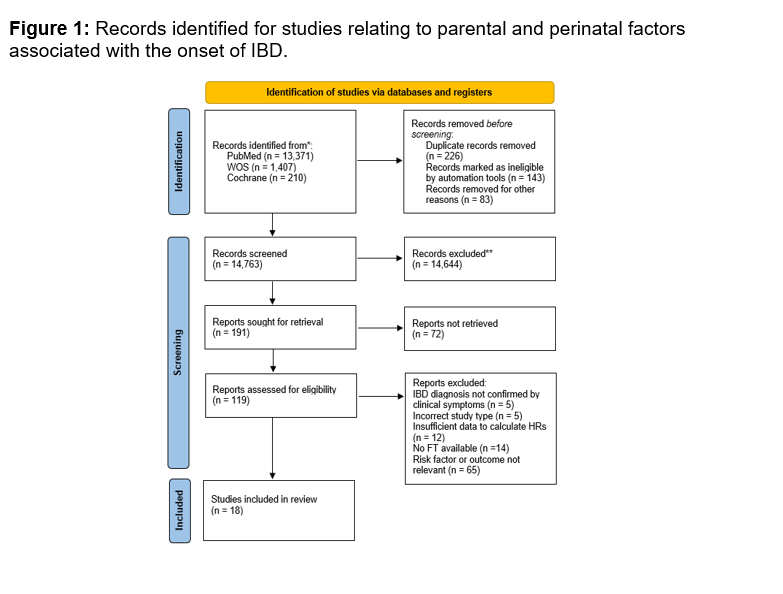P883 Parental and perinatal risk factors associated with onset of Inflammatory Bowel Disease: A systematic literature review and meta-analysis.
Mallon, K.(1);Mcbride, C.(1)*;Doherty, G.(2);Burns, R.(1);
(1)The Health and Biomedical Research Centre HEAL- Atlantic Technological University, Department of Health and Nutritional Science- Atlantic Technological University, Sligo, Ireland;(2)University College Dublin UCD, INITIative Research Network- School of Medicine- UCD, Dublin, Ireland;
Background
Several risk factors have been associated with the onset of Inflammatory Bowel Disease (IBD), including pre and early life exposures occurring during gestation and up to the end of an infant’s first year of life.
Perinatal factors linked to the subsequent development of IBD include parental and environmental exposures. It is postulated that exposure to such factors impacts immune system development leading to alterations in immune responses and increased susceptibility to disease.
Limited evidence evaluates this association systematically whilst focusing specifically on the perinatal period. The purpose of this review was to systematically determine whether parental and perinatal factors are associated with IBD onset.
Methods
We searched the following electronic databases: Ovid MEDLINE, Web of Science, and the Cochrane Library. Searches were conducted from 01/01/2002 until 26/01/2022. Keywords and search terms related to ‘perinatal’ and ‘inflammatory bowel disease’ were applied.
Case control studies, RCTs and cohort studies evaluating the association between parental and perinatal factors and IBD were included.
Study protocol details have been published on the International Prospective Register of Systematic Reviews (PROSPERO). Available from: http://https://www.crd.york.ac.uk/prospero/display_record.php?ID=CRD42022290798Databases
Results
Our initial search identified 14,989 potentially relevant articles to include (see Figure 1). After title and abstract screening there were 119 articles that met the eligibility criteria. After full-text review and further assessment of these 119 articles, 18 articles were deemed suitable for study synthesis based on the eligibility criteria.
Across the 18 articles, a range of parental and perinatal factors were included: family history IBD (n=8), breastfeeding (n=7), disease during pregnancy (n=4), maternal age (n=4), birth delivery method (n=4), antibiotic exposure (n=3), pre-term birth (n=3), birth weight (n=2), environmental exposures in infancy (e.g. pet exposure, rural dwelling) (n=2), diet (n=1), vaccination (n=1) and maternal smoking (n=1).
Conclusion
This review provides a detailed summary of parental and perinatal factors associated with the onset of IBD. The evidence generated will influence the development of diagnostic risk assessment tools and detailed patient pathway paradigms to address current shortcomings within the delivery of IBD care, providing opportunities to improve efficiency and reduce healthcare costs. The findings will inform on key targets for primary prevention strategies at this early life stage and provide valuable insight on IBD onset to academics, clinicians, patients and policy makers.
- Posted in: Poster Presentations: Epidemiology 2023


